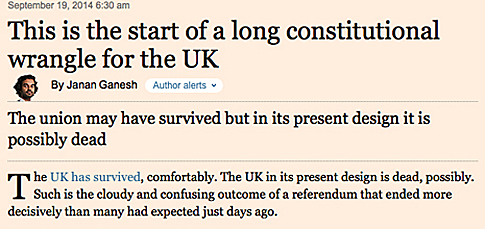Cosas de Financial Times, que sigue siendo el diario financiero más influyente de Europa.
Tesis muy simple y fácil de comprender:
-“El Reino Unido ha sobrevivido, confortablemente. Pero probablemente ha muerto en su arquitectura política actual”.
-“Comienza una larga batalla de reformas institucionales”.
The UK has survived, comfortably. The UK in its present design is dead, possibly. Such is the cloudy and confusing outcome of a referendum that ended more decisively than many had expected just days ago.
Scots have affirmed the union by a projected margin of 55 per cent to 45 per cent. The rush of nationalism that showed up in the polls at the turn of September was not enough; wavering voters cleaved to the security of what they had. A unionist campaign that was traduced by armchair strategists for subjugating romance to fear-mongering turned out to be effective enough. Peter Kellner, the president of the polling company YouGov, told the BBC last night that unanswered questions about an independent Scotland’s economy – and, above all, its currency – were what ultimately told.
And yet the result is the start of a constitutional wrangle, not the end of it. That more than two in five Scots – and their biggest city, Glasgow – have voted to leave the UK is no small matter, and will have to be recognised in the form of new powers for the Edinburgh parliament. When the referendum was announced two years ago, the more sanguine unionists expected barely 30 per cent to plump for secession. Had Alex Salmond been better at managing expectations of late, the nationalist first minister of Scotland would now be written up as a man of pluck and derring-do who pushed a 300-year-old union to the edge of oblivion.
What is more, all the major political parties in Westminster have already promised a new, dramatic but vague round of devolution to Scotland. Fleshing this out, getting it through parliament and then balancing it with new powers of self-rule for England could be the work of years, not months. There is no clean answer to the governance of the UK, no rationalist blueprint that pleases every component of a multinational kingdom in which one nation, England, is so dominant. Imagine if Bavaria accounted for 85 per cent of Germany’s population.
Still, the first few steps in this long and tortuous path will soon be possible to discern. David Cameron, the Conservative prime minister, is to make an announcement on constitutional change at 7am on Friday. The precise shape and contours of the union hinge on his words… Financial Times, 19 septiembre 2014, Janan Ganesh, This is the start of a long constitutional wrangle for the UK.
[ .. ]
Las negritas son mías.
En términos mucho más elípticos, David Cameron no dice otra cosa: David Cameron sets out UK-wide changes ‘to build better future.
Escocia / Cataluña, Reino Unido / España: la lección del Duelo a garrotazos.

Deja una respuesta